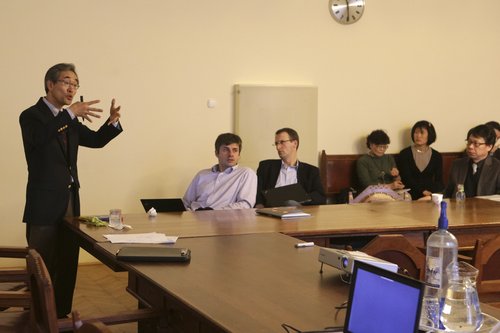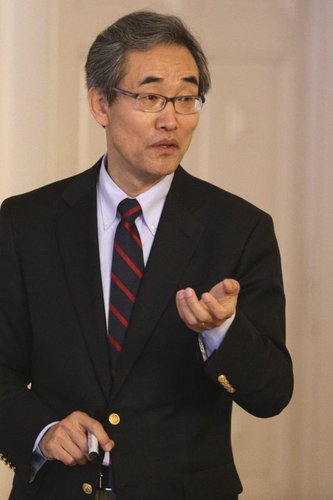Refocusing on God's Kingdom
2014. március 04., keddPark One Ho, the senior pastor of the Lord Church in Seoul, South Korea, was a recent guest of the Reformed Church in Hungary. With more than 12,000 active members, his congregation, Lord Church, is one of the largest congregations of the Presbyterian Church in Korea.
The pastor visited Hungary within the framework of his sabbatical semester. The former professor of the Seoul Presbyterian Theological Seminary, which is a partner institute of Debrecen Reformed Theological University, gave lectures on theology and religious pedagogy in Sárospatak, Debrecen and at the Faculty of Law at the Károli Gáspár University.
Park gave a public lecture in the Synod Office entitled “Mission and/or Strategy,” during which he gave an account of the theological and practical aspects of congregational mission. What is the secret of the Presbyterian Church in Korea's sudden growth? How can we capture the work of the Holy Spirit, the power of prayer and the preparation for discipleship in the wake of our everyday lives? What is the importance of strategic planning and a well-organized congregational life? Even if he could not give us a final answer to these questions, Park emphasized the rationality in the work of the Holy Spirit, and the harmony of God's blessing and human efforts in building up congregations.

The essence of Park's message can be summarized by the radical central role of God's Kingdom: if the congregation lays great importance on the transformative reality of God's Kingdom, then it will grow. Its godliness will be determined by Christ's cross and by such universal values as justice, peace and Christian joy. The members will not only be "consum Christians" but disciples of Jesus, who are willing to make a sacrifice. If the Christian community only concentrates on the Constantinian, "imperial" growth of church, then it will lose its already existing members. The out of date structures and money will be the centre of attention, and as a consequence of this, power and loyalty will become the most determining values. This can also be a danger in Korea, with its 150-year-long reformed traditions. Although the Christian community is not under the burden of being a state religion, such 'mega congregations' were established in the expansion in which the money, growth, the hierarchy of the local church, and the 'success' of this expansion could easily become absolute values, endangering the true witness and discipleship.
Using his congregation as an example, Park stressed the power of prayer and the importance of discipleship. A comprehensive knowledge of the Bible and the recognition and use of reformed values in the lives of congregation members is crucial in order to talk about real growth and development in the congregation. "The biggest temptation of a pastor is to only expect small commitments from believers, respecting their busy schedules too much," said the Korean pastor.

In his congregation in Seoul, Park has started a three-year-long Bible school program, building on 3-month long sessions, which today more than two thousand people have completed. From basic knowledge of the Bible through a Christian way of living and social responsibility, the course prepares members for discipleship. The participants can express their commitment to the Kingdom of God by adjusting their lifestyle to the course. The pastor, who graduated from Princeton Theological Seminary, has prepared this Bible school model in detail during his sabbatical, and he offers it to other Korean congregations and partner churches all over the world. Prayer is the essential part of the congregations’ life, which shows us great dedication. At half past five every morning, and again at ten o'clock Friday evenings, hundreds of believers gather and pray together.
The "Lord Church" was founded in downtown Seoul 25 years ago. With the leadership of Park, the congregation lived through rapid growth. The four services on Sunday are visited by 9,000 people. Still, the strength of the congregation does not come from its huge size, but rather from the three-year long Bible school and from focusing on the discipleship of Jesus. This all builds up a personal commitment and dedication in the members, as it's phrased in their statement: "As Jesus gathered the first disciples he gathers as now to take part in services and get to know the Word of God. So he can teach, prepare and shape us for our mission for the world."
Park talked about the special relationship between the Hungarian and Korean reformed people. The Korean Church considers the Hungarian partnership incredibly important, because the Hungarian Church maintains Calvinist traditions and because of its more than one hundred-year fight for faith. We can find parallels in the history of these two churches as well. When the American Presbyterian missionaries arrived to Korea in 1884, it was one of the poorest countries in the world. Korea lived under the pressure of the great powers, primarily China, and from 1905-1945 Japan invaded the country. The reformed fate, as in the earlier reformation in the Hungarian Kingdom, appeared and spread in Korea as the source of true hope, changing the whole life of society. The reformed religion is considered a national one, which through the help of education and pedagogy, also with the help of its schools, could root and spread quickly. In political life, the reformed people were over-represented in comparison to their proportion in society. Reformed Christianity in social life meant the freedom of the country and religion. And last but not least the goal of reuniting North and South Korea and a commitment to creating the unity of the nation creates a special parallelism in the life of the two communities. The declaration of church unity in the Carpathian Basin is an encouraging example set for the Korean reformed who are praying for the unity of their nation and taking steps to achieve its preparation. However, their goal is essentially political compared to the efforts of the reformed in the Carpathian Basin.
The Korean pastor met with the leaders of the RCH, including Bishop Gusztáv Bölcskei, and visited the Korean Reformed Congregation in Budapest, since the leader of the congregation, Rev. Jeong Chea Hwa receives great support from the Seoul congregation in his service in Hungary. Park could make his personal impression about the service of the refugee and Roma mission. He met the leaders of these ministries, and also visited the Hungarian and Sub-Carpathian pastors who are involved in the qualification of Roma mission co-workers as well as the local mission leaders in Piliscsaba.
An unwritten law of the Lord Church, employing 25 co-workers, is that they do not maintain a building or church. Instead, they spend more than half of their income on missions and social services. Within this framework, they do not only support the Korean congregation in Hungary, but the Roma mission initiatives of the RCH as well.
Ecumenical Office; translated by Anita Poglári
photos: Vargosz
Contact us
Click here if you are interested in twinning.
Reformed Church in Hungary
Address: H-1146 Budapest, Abonyi utca 21.
PO Box: 1140 Budapest 70, Pf. 5
Email: oikumene@reformatus.hu
English, German and Korean language services in Budapest
Links
Recommended articles
-
Pastoral Letter in the Light of the Pandemic
Bishop Dr. István Szabó sent a pastoral letter of encouragement to the ministers serving in RCH’s congregations, expressing his gratitude for the persistence and creativity of the pastors.
-
RCH Joins in Pope's Call for Prayer
RCH published the call on congregations to join the initiative of Pope Francis, supported by ecumenical organisations, to unite in praying the Lord’s Prayer on Wednesday, 25 March, at noon.
-
English Speaking Worship Services Online
Each Sunday at 11 AM (CET) the St. Columba's Church of Scotland in Budapest, the international community of RCH invites you to join the worpship service on its facebook page.
-
Test of Humanity and Companionship
Reformatus.hu asked Dr. György Velkey, Director General of the Bethesda Children’s Hospital of RCH about the challenges of health care workers and ways of prevention against the pandemic.
-
All Church Events Suspended
In light of the coronavirus the Presidium of RCH requested congregations to suspend all church events with immediate effect. Beside restrictions, it calls for prayer, sobriety and responsibility.











